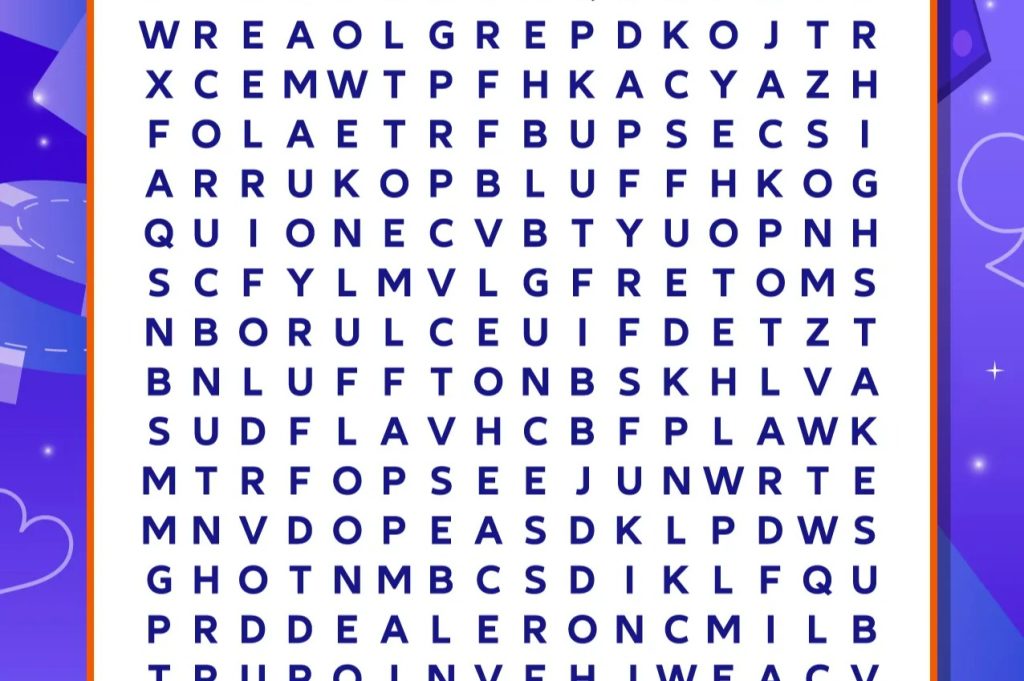The Allure of the Word Search Challenge
Casino.co.uk has crafted a word search puzzle that claims to distinguish those with genius-level intellects based on their ability to find eight hidden words within a 180-second timeframe. This type of brainteaser, a classic example of a mental puzzle, presents a grid of seemingly random letters within which specific words are concealed. The challenge lies in discerning these words by meticulously scanning the grid, horizontally, vertically, and diagonally, amidst a jumble of similar letters designed to camouflage the target words. This seemingly simple task requires keen observation, focus, and a degree of cognitive dexterity. The puzzle’s creators posit that only a select 10% of individuals possess the mental acuity to accomplish this feat within the allotted three minutes.
Cognitive Calisthenics: The Benefits of Puzzles
Puzzles, including word searches, offer more than just a fleeting moment of entertainment. They serve as effective tools for stress reduction and can ignite a surge of creative energy. These mental exercises engage various brain regions, stimulating cognitive functions and enhancing mental agility. Solving puzzles necessitates analytical thinking and refines problem-solving skills. The process of searching for hidden words or deciphering visual illusions involves memory recall, contributing to improved memory function. Moreover, puzzles encourage "out-of-the-box" thinking, nurturing creativity and fostering innovative thought processes. The focused concentration required to solve these challenges also sharpens attention span and enhances overall focus. Finally, the inherent enjoyment derived from successfully completing a puzzle provides a welcome respite from stress and promotes relaxation.
Optical Illusions: A Window into Perception and Cognition
Optical illusions, another form of brain teaser, offer a unique perspective into the intricacies of human perception and cognitive processing. They present images that appear to defy logic or deceive the eye, forcing the observer to look beyond the obvious and engage in deeper analysis. This process stimulates multiple brain regions simultaneously, enhancing cognitive flexibility and perceptual acuity. Optical illusions challenge our assumptions about how we perceive the world, highlighting the complex interplay between sensory input and cognitive interpretation. They can reveal the limitations of our visual processing and demonstrate how our brains can be tricked into perceiving something different from reality.
The Dual Nature of Brain Teasers: Challenge and Reward
Brain teasers, whether in the form of word searches or optical illusions, offer a compelling combination of challenge and reward. They present a mental hurdle that requires focus, analytical thinking, and sometimes a touch of creativity to overcome. The satisfaction derived from successfully solving a puzzle, from finding the hidden words or deciphering the illusion, provides a sense of accomplishment and reinforces the positive effects of mental stimulation. This inherent reward system encourages further engagement with these types of activities, fostering a continuous cycle of cognitive improvement and enjoyable mental exercise.
Delving Deeper: The Science Behind Cognitive Enhancement
The benefits of engaging with puzzles and brain teasers extend beyond mere entertainment and stress relief. Research suggests that these activities can have a significant impact on cognitive function, particularly in areas like memory, attention, and problem-solving. The mental effort required to decipher a complex puzzle strengthens neural connections and enhances cognitive flexibility, the ability to adapt to new situations and challenges. Regular engagement with these types of activities can contribute to maintaining cognitive health and mitigating age-related cognitive decline. By challenging the brain with novel and stimulating tasks, puzzles promote neuroplasticity, the brain’s ability to reorganize itself by forming new neural connections throughout life.
The Broader Implications of Cognitive Training
The skills honed through puzzles and brain teasers can translate to real-world benefits. Improved problem-solving abilities, enhanced focus, and heightened creativity can contribute to greater success in academic, professional, and personal endeavors. The ability to think critically and analytically, to approach challenges from different perspectives, and to persevere in the face of difficulty are valuable assets in any field. By regularly engaging in cognitive exercises, individuals can cultivate these skills and enhance their overall cognitive fitness, paving the way for greater success and fulfillment in all aspects of life.




